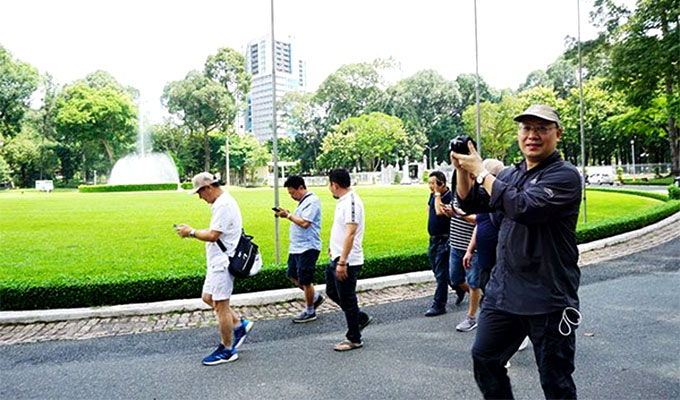The Vietnamese tourism sector is on upward trend, largely owing to a surge in arrivals from Asian tourists, which accounted for 77.7% of the international arrivals in the country over the past nine months, according to the General Statistics Office.

International tourists at Reunification Palace in HCMC’s District 1
Data from the General Statistics Office show that over 11.6 million international tourists entered Viet Nam during the nine-month period, up 22.9% year-on-year, with more than nine million visitors coming from Asian countries, rising by 27.2%.
In Asia, Chinese and South Korean tourists accounted for over two-thirds of the country’s total arrivals. Also, Viet Nam welcomed 3.8 million Chinese tourists, up 29.7% and more than 2.56 million South Korean travelers, surging by 49.6% over the January-September period.
The Asian market makes up a large market share in Viet Nam due to the region’s geographical proximity to Viet Nam and its large tourist source. However, the country’s tourism sector heavily depends upon the Chinese and South Korean markets, as a majority of tourists come from these two countries.
Travel firms suggested tourism authorities to seek ways for tapping other markets with significant potentials, in a bid to raise the number of arrivals and diversify the markets.
Although many Japanese travelers prefer Viet Nam as a destination of choice, the growth of Japanese arrivals has slowed. Some 623,700 Japanese tourists traveled to the country over the past nine months, up only 4.2% year-on-year. Many Japanese firms attributed the slow growth to Viet Nam’s failure in meeting Japanese tourists’ tastes and an absence of social networking services and communication apps.
For example, many Japanese people are greatly impacted by various photos and videos about trips posted on some social media, such as Line and Instagram, but Viet Nam has yet to access these advertising channels for the tourism sector.
Nguyen Son Thuy, director at Indochina Unique Tourist Co. Ltd., said there were many potential source markets in Southeast Asia for Viet Nam to develop its tourism sector. Taking Thailand as an example, Thuy said that many Thai tourists tend to visit some destinations in Central Viet Nam.
A series of air routes opened to link these localities and Thailand has recently encouraged the country’s tourism sector. Thuy also suggested that more promotional programs and tourism activities should be carried out to turn Viet Nam into an attractive tourist destination for Thai visitors.
“The company welcomes some 4,000 Thai travelers to Da Nang City and some localities in Central Viet Nam each month,” Thuy said, adding that a Thai travel firm has come to Viet Nam under the company’s arrangement to survey destinations and research products.
The data also indicated that the number of European and American tourists to Viet Nam increased modestly over the January-September period. Over 1.53 million European travelers arrived in the country, up 9.8% year-on-year, while American arrivals amounted to 528,600, rising 14.1% against the same period last year.